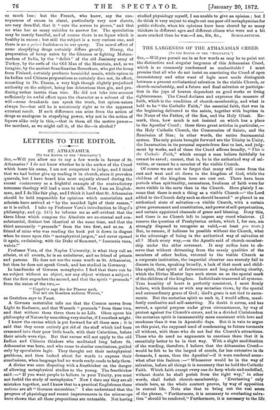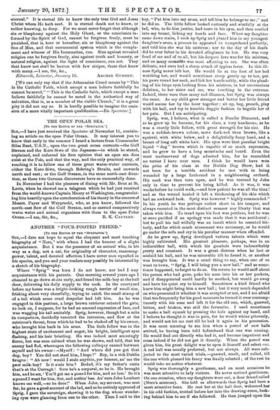THE LA.RGENESS OF THE ATHANASIAN CREED.
[TO THE EDITOR OF THE "SPECTATOR."]
SIR, —Will you permit me in as few words as may be to point out the distinctive and singular largeness of this Athanasian Creed,
which is so commonly condemned as uncharitable ? I must premise that all who do not insist on convicting the Creed of open
inconsistency and utter want of logic must needs distinguish between a present ecclesiastical salvation in the visible Church, or church-membership, and a future and final salvation or participa- tion in the joys of heaven dependent on good works or living righteousness. The Creed declares and expresses the measure of faith, which is the condition of church-membership, and what is held to be "the Catholic Faith," the essential faith, that was in the beginning delivered to the saints, together with baptism in the Name of the Father, of the Son, and the Holy Ghost. Re- mark, then, how much is not insisted on which has a place in the Apostles' Creed ; these three great articles in particular,— the Holy Catholic Church, the Communion of Saints, and the Remission of Sins ; in other words, the entire Sacramental system. The only points brought forward are the Trinity in Unity, the Incarnation in its personal aspects from first to last, and judg- ment by works, and of these the Creed affirms broadly, "This is the Catholic Faith," which except a man believe faithfully he cannot be saved ; cannot, that is, be in the authorized way of sal- vation, or cannot be a member of the visible Church.
Of course we are not to forget that many will come from the east and west and sit down in the kingdom of God, while the children of the kingdom here are cast out. There have been periods when spirituality, earnestness, liveliness of faith were far more visible in the sects than in the Church. Here plainly I as- sume that there is such a thing as a visible Church--" the Lord added to the Church daily such as should be saved" or placed in an authorized state of salvation—a visible Church, with a certain given government and constitution, and power of self-perpetuation, and certain appointed channels of grace and blessing. Deny this, and there is no Church left to impose any creed whatever. (I reserve the question of Presbyterian orders, which I, for one, am strongly disposed to recognize as valid,—at least pro tanto.) But, to resume, if holiness be possible without the Church, what is the advantage of being in the authorized way of salvation at all ? Much every way,—as the Apostle said of church-member- ship under the older covenant. It may suffice here to ob- serve that without detracting from the manly qualities of the members of other bodies, external to the visible Church as a corporate institution, the impartial observer can scarcely fail to discern in them, speaking broadly, a lack of that meek and child- like spirit, that spirit of forbearance and long-enduring charity, which the Divine Master lays such stress on as the special mark of the children of the kingdom. Individuals transcend all systems. True humility of heart is perfectly consistent, I most firmly believe, with Socinian or with any sectarian views, by the special and extraordinary grace of God ; God's grace is not tied to sacra- ments. But the sectarian spirit as such is, I would affirm, mani- festly combative and self-asserting. No doubt it serves, and has served, a special purpose under given circumstances, by way of protest against the Church's errors, and in a divided Christendom the sectarian spirit is immeasurably more consistent with love and meekness than it was in Apostolic days. But it is vain to argue on this point, the supposed need of condemning to future torments all without, with those who do not feel the Church's attractions. Those who do need no arguments to convince them that it is essentially better to be in that way. With a slight modification of the wording, therefore, I believe that the Athanasian Creed— would be felt to be the largest of creeds, far less extensive in its demands, I mean, than the Apostles'—if it were rendered some- what after this fashion :—" Whosoever would be in the way of salvation, before all things it is necessary that he hold the Catholic Faith. Which faith except every one do keep whole and undefiled, without doubt he shall perish from the right way," in other
words, shall forfeit church-membership. Everlasting only stands here, as the whole context proves, by way of apposition to eternal life. Note also that to bring out the real same of the phrase, "Furthermore, it is necessary to everlasting salva- tion" should be rendered," Furthermore, it is necessary to the life eternal." It is eternal life to know the only true God and Jesus Christ whom He bath sent. It is eternal death not to know, or rather knowing, to deny. For we must never forget that although tin or blasphemy against the Holy Ghost, or the conscience in- Conned by the Spirit of God, cannot be forgiven freely, must be punished, that is, here or hereafter, sin or blasphemy against the Son of Man, and that sacramental system which is the comple- ment and witness of His Incarnation, can. Sins against revealed religion can be forgiven freely, sins against truth and honesty, or natural religion, against the light of conscience, can not. They that know not shall be beaten with few stripes, those that know with many.—I am, Sir, &c.,
Kibworth, Leicester, January 16. ARCHER GURNEY.
LWe can only say that if the Athanasian Creed means by "This is the Catholic Faith, which except a man believe faithfully he cannot be saved," "This is the Catholic faith, which except a man believe faithfully he cannot be saved in the authorized way of etdvation, that is, as a member of the visible Church," it is a great pity it did not say so. It is hardly possible to imagine the omis- sion of a more vitally important qualification.—En Spectator.]



































 Previous page
Previous page